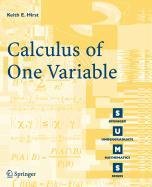Items related to Calculus of One Variable

Synopsis
The development of the di?erential calculus was one of the major achievements of seventeenth century European mathematics, originating in the work of N- ton, Leibniz and others. Integral calculus can be traced back to the work of Archimedes in the third century B. C. Since its inception, calculus has dev- oped in two main directions. One is the growth of applications and associated techniques,indiverse?eldssuchasphysics,engineering,economics,probability and biology. The other direction is that of analytical foundations, where the intuitive and largely geometrical approach is replaced by an emphasis on logic and the development of an axiomatic basis for the real number system whose properties underpin many of the results of calculus. This approach occupied many mathematicians through the eighteenth and nineteenth centuries, c- minating in the work of Dedekind and Cantor, leading into twentieth century developments in Analysis and Topology. We can learn much about calculus by studying it
"synopsis" may belong to another edition of this title.
(No Available Copies)
Search Books: Create a WantCan't find the book you're looking for? We'll keep searching for you. If one of our booksellers adds it to AbeBooks, we'll let you know!
Create a Want
